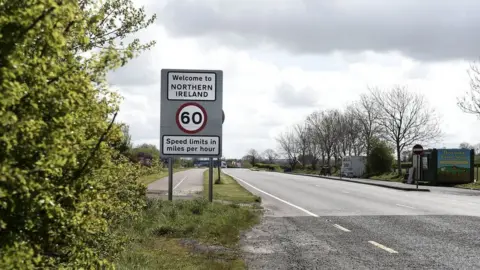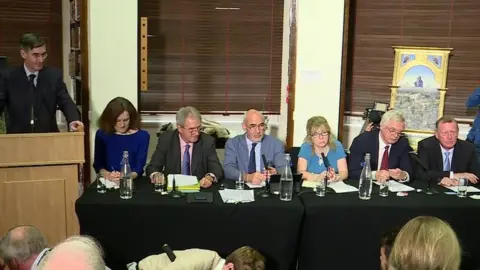Brexit: Tory MPs say technology key to avoiding hard Irish border
 Getty Images
Getty ImagesA hard border on the island of Ireland can be avoided by using "established" technology and "modifying" existing arrangements, Brexiteer Tory MPs say.
The European Research Group called for streamlined customs checks and closer working between Belfast and Dublin to allay compliance and smuggling fears.
The Democratic Unionist Party welcomed the "positive and timely" report but Sinn Fein said it was "pure fantasy".
The EU has insisted on a "backstop" to ensure the single market is protected.
Both the UK and the EU want to avoid a return to physical checks at the Northern Ireland border, but have yet to agree how this can be achieved.
Downing Street said it had looked at the border issue for nearly two years and the prime minister's Chequers blueprint - which envisages a free trade zone for goods moving between the UK and the EU backed up by a "facilitated customs arrangement" - was the "only credible and negotiable option".
And Ireland's foreign minister Simon Coveney said the proposals were an "unworkable distraction".
Allow X content?
The ERG's answer to the problem of the Irish border seemed to be that "there isn't really a problem", the BBC's assistant political editor Norman Smith said.
The group was citing the example of the "invisible border" between Norway and Sweden as a precedent for how post-Brexit arrangements might work, he added.
Speaking at the launch of the ERG's report in London, former Northern Ireland Secretary Owen Patterson said he and other MPs were trying to help the European Union and Theresa May by "giving an answer" to a problem which has risked derailing the Brexit process.
He insisted there was "absolutely nothing new" in what the group was proposing because the solutions already exist to deliver "an ordered border".
There was already, he argued, a tax, VAT, excise and currency border between Northern Ireland and the Republic of Ireland which was policed effectively by "administrative and technical tools".
This should continue after Brexit, he said, supplemented by a range of mechanisms to ensure new customs checks are conducted away from the border, such as trusted trader schemes.
"We absolutely believe there is no need for new physical infrastructure at the border and it can be handled by current means," he said.
The report acknowledges a range of new checks will be needed on goods passing across the 310 mile border between Northern Ireland and the Republic of Ireland after Brexit, including extra customs declarations and declarations of origin as well as sanitary, phytosanitary and product compliance procedures.
Among the proposals put forward in the document to deal with these are:
- Extra customs declarations should be incorporated into existing online system of VAT returns
- Simplified customs procedures to deal with the majority of cross-border trade
- Trusted trader-type schemes for large companies
- Equivalence of UK and EU regulations for agricultural produce
- Declaring the island of Ireland a Common Biosecurity Zone
The report concluded: "The proposals can be realised within the existing legal and operational frameworks of the UK and EU, based on the mutual trust on which regular trade depends.
"They do nothing to alter the constitutional position of Northern Ireland and do not violate the principle of consent of the enshrined in the Belfast Agreement."

Are Tory MPs set to move against Theresa May?
There is massive frustration with her leadership, her position on Chequers and the way her proposals tuck the UK closely into the EU in perpetuity. And yes, there are some MPs who want to see her gone immediately.
However senior voices in the European Research Group - yes them - are adamant that it is not the time to try to oust the PM. It would be "stupid", one told me last night.
Imagine in these critical weeks of the Brexit negotiations if the UK started to try to change the prime minister.
Right now those jostling to remove her know they don't have any guarantees they would have the numbers to force her out, even though they may well be able to pull together enough MPs to submit letters to the chair of 1922 committee to trigger a contest.

John Campbell, the BBC's Northern Ireland business and economics editor, said the document offered more detail than before and put forward a number of "plausible technocratic solutions".
But he said they placed a lot of store on the EU agreeing to mutual recognition of standards and the UK having access to its VAT system - which was far from guaranteed.
The Democratic Unionist Party, whose support Theresa May relies on for her majority in Westminster, said the proposals were "positive and timely" and the issue should not be an impediment to a wider Brexit deal.

But Sinn Fein said there was no reference to the civil rights of those living on both sides of the border nor any recognition of the fact that Northern Ireland had voted to remain in the EU in the 2016 Brexit referendum.
"These proposals are a rehash of the unacceptable and already rejected and failed notion that a technological border can be put imposed post Brexit," said South Down MP Chris Hazzard.
The CBI said the proposals were "superficial", while shadow Brexit secretary Sir Keir Starmer said what was needed was a UK-wide solution, which would see the whole country stay in some form of customs union.
"Ireland cannot pay the price of Theresa May's failed negotiating strategy," he said on a visit to Belfast.
"The solemn commitment to no hard border in Northern Ireland is really important and no-one should be casual about that."
At the event, Tory MPs opposed to Theresa May's Chequers blueprint have denied plotting against her, after it emerged the issue of her future was discussed openly by Tory MPs at a meeting on Tuesday night.
"We've got a very good prime minister," former Brexit Secretary David Davis said.
"I disagree with her on one issue, it's this issue. She should stay in place because we need stability, and we need decent government as the backdrop for what we're doing in the coming next six months."
